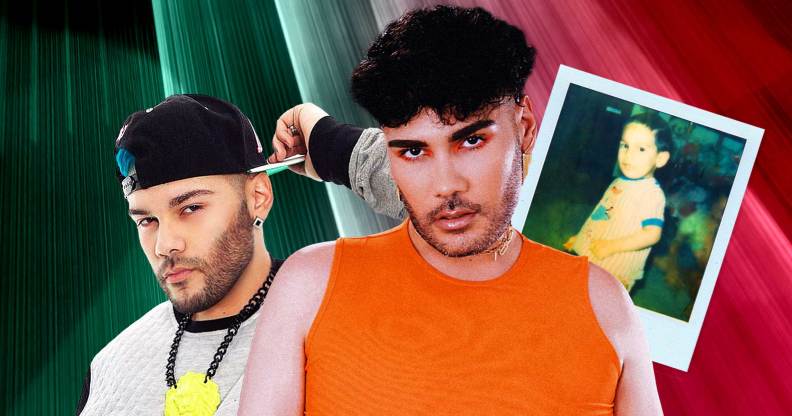Gay Latinx rapper Loco Ninja: ‘Being visible is the reason why I do what I do’

Loco Ninja’s music and style has evolved as he’s learned to embrace every facet of himself. (Supplied)
A chance encounter can sometimes change your entire life. 15 years ago, queer Latinx rapper Loco Ninja was hanging out with friends in the West Village area of New York City, which had long been known as a safe space for the LGBTQ+ community.
At that time, as an 18-year-old, he was known only as Richie. A woman came up to him and said: “‘You seem like you have a story. Can I talk to you for a second?’” Long story short, Richie ended up being invited to The Tyra Banks Show to talk about his life and the challenges of growing up gay in Spanish Harlem.
Supermodel and TV star Tyra Banks introduced Richie to the ballroom scene – a thriving and dynamic group of LGBTQ+ people and allies who excelled in the art of voguing, runway walking, and creating the most stunning and sickening fashion looks. This was a life-changing moment for Richie. He joined the House of Ninja – the legendary ballroom house created in 1982 by Willi Ninja, the star of Paris is Burning who was also known as the “Godfather of Vogue.” The house is now led by Benny Ninja, who took Richie under his wing and mentored him. This was when he became Loco Ninja.
“I would just go to the balls and compete for medals and the cash prize,” he remembers. “I am still representing the House of Ninja everywhere I go. It’s where my name comes from because that’s where it all began for me.”
Growing up in Spanish Harlem, Loco had big dreams of breaking into the music industry. “I wanted to be on stage and I wanted to entertain and inspire people,” he says. “So I started creating rhymes and raps in my bedroom.” Gradually, he started recording and getting the attention of artists he admired on social media.
Now, with over 200,000 followers on Instagram, Loco posts a compelling mix of fashion, music and beauty content, blending fun and irreverence with a more serious side. “Posting on social media helps me to let go of the fear that society once put around me,” he says. “I wear dresses proudly as a non-binary human being, because it may inspire others to live authentically.”
Loco’s approach to fashion and beauty is particularly subversive in the hip-hop industry. Growing up, Loco noticed that rap and hip-hop were male-dominated spaces where machismo and bravado reigned supreme. Living authentically as a queer rapper whose work celebrates femininity is boundary-breaking for the genre, but Loco took steps to get there gradually.
“When I first started out, I was wearing baggy clothes and a varsity jacket, because of the toxic masculinity in hip-hop,” he explains. “So this is me doing my part and just saying: ‘You know what? I’m gonna just do me and be me’. If I want to rap in heels and a skirt then I’m going to do it.”
Becoming more confident in himself has had a huge impact on how Loco feels about his own sexuality and relationships. “In the beginning, I wasn’t confident in my sex life or being sexual with anyone,” he says. “I felt like I needed to know myself more to feel confident in my body.” Now, Loco has embraced being a voice for his community and about sexual health in particular.
“For me, PrEP is a huge deal in my daily life and is a major part of my wellness routine. By taking PrEP, I’m preventing myself from contracting the virus and helping to stop the spread of HIV,” he says. “We’ve got to fight the stigma, but also take care of each other as a community.”
In the future, Loco wants to continue using his platform to speak out about social justice topics that are important to him, like the legislative attacks on trans people and drag performers that are sweeping the US. More than anything, he wants to be a voice for queer and gender non-conforming people everywhere.
“I didn’t have that growing up. I didn’t have any representation on television and there was no social media,” he says. “So being visible is the reason why I do what I do.”
After overcoming so many obstacles in his journey, Loco hopes that living authentically and prioritizing self-love, in all spaces from fashion to sexual health and wellness, will be his lasting legacy. “Everyone has the right to love themselves,” he says.
“I want to help shape and shift what’s going to happen after me. That’s my purpose.”
How did this story make you feel?

